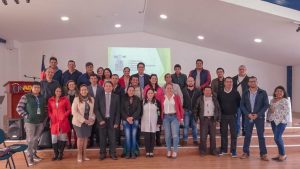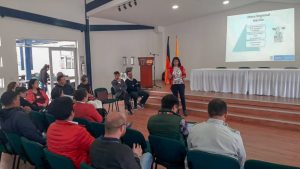The members of the Regional Table of Sustainable Livestock of Nariño, the National Technical Secretary Germán Serrano and the Regional Technical Secretariat in charge of AGROSAVIA, with the support of GGGI and the Norwegian Embassy, convened on July 9 at the National at Distance and Open University – UNAD in Pasto, Nariño.
support of GGGI and the Norwegian Embassy, convened on July 9 at the National at Distance and Open University – UNAD in Pasto, Nariño.
The meeting served as a platform to revitalize the sustainable livestock industry through knowledge-sharing of experienced actors from both the public and private sector. It also served to illustrate the current industry situation, articulating the progress made to-date and the present challenges that exist on global, national, and regional scales. These highlighted themes are to be registered in order to support the design and construction of a Public Policy towards Sustainable Bovine Livestock.
During the event, the former Technical Secretary of the Dairy Committee of Nariño, Miss Miriam Santacruz, presented a summary of the work completed to-date in this livestock production region of Colombia. Miss Santacruz also expressed the need to strengthen the Regional Table through incorporating recommendations found in the national government’s action plan surrounding the subject.
During the latter half of the event, a collaborative discussion was carried out concerning national-level issues and goals that will be relevant over the next two (2) years. The discussions centered around the structure and function of the Regional Tables, as well as issues pertaining to the construction of action plans for the years 2019 and 2020. Colacteos, the region´s main dairy industry, was elected as Presidency of the Table regarding public and private articulated efforts to increase sustainability in this important economic sector for Nariño.
 Attendees were enthusiastic, expressing their willingness to continue strengthening internal dialogue and interaction with entities involved with the Regional Table in Nariño. They also voiced their readiness to integrate their efforts with those of the region’s dairy production chain. Several important themes were highlighted by attendees, being: knowledge management, research on market demand, and the effects of the region’s livestock activity on strategic ecosystems such as the páramos.
Attendees were enthusiastic, expressing their willingness to continue strengthening internal dialogue and interaction with entities involved with the Regional Table in Nariño. They also voiced their readiness to integrate their efforts with those of the region’s dairy production chain. Several important themes were highlighted by attendees, being: knowledge management, research on market demand, and the effects of the region’s livestock activity on strategic ecosystems such as the páramos.
The need to create a department-level-project to strengthen sustainable livestock reconversion efforts stood out as a key takeaway. Such a project would need to both improve performance and efficiency indicators, but also improve the overall competitiveness of the industry. Ultimately, it will aim to enable the industry to improve its provision of dairy and meat products to consumers, serving to better sustain the population. This will be supported through payment for environmental services under a diversified comprehensive model.